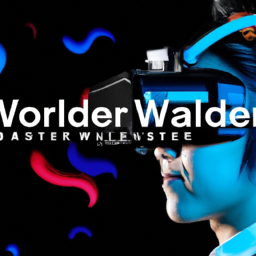The Future of Virtual Reality in Digital Marketing: Discuss the potential impact and benefits of VR in digital marketing.
Introduction
Virtual Reality, or VR, has rapidly emerged as one of the most exciting technologies in recent times. Originally associated with gaming and entertainment, VR is now making its way into various industries, including digital marketing. With its immersive and interactive capabilities, virtual reality has the potential to revolutionize how brands engage with consumers. In this blog post, we will explore the potential impact and benefits of VR in digital marketing and discuss how it shapes the future of the industry.
What is Virtual Reality?
Virtual Reality refers to a computer-generated simulation of a three-dimensional environment that can be interacted with using specialized electronic equipment, such as headsets or gloves. It transports users into a realistic virtual world, simulating their physical presence in a completely different environment.
The Potential Impact of VR in Digital Marketing
Virtual Reality has the power to transform the way brands communicate their messages to consumers. By creating immersive experiences, VR can capture attention and trigger emotional responses, ultimately leading to stronger connections with the brand. Here are a few potential areas where VR can have a significant impact on digital marketing:
Enhanced Product Visualization and Demonstrations
Virtual Reality can provide consumers with a realistic and immersive visualization of products or services. Brands can create virtual showrooms or product tours, allowing customers to explore and interact with their offerings in ways that traditional methods cannot replicate. This enhanced visual representation can boost customer engagement and facilitate informed purchasing decisions.
Virtual Try-ons and Personalized Shopping Experiences
One of the biggest advantages of VR is its ability to provide personalized experiences. In the fashion and retail industry, for example, VR can allow customers to virtually try on clothes, accessories, or even test drive cars without needing a physical presence. This technology enables consumers to make better purchasing decisions by virtually experiencing products and reducing the need for returns.
Immersive Brand Storytelling
VR creates an opportunity for brands to immerse customers in their story like never before. Companies can develop virtual reality experiences that transport users into their brand’s universe, where they can interact with products or services in a way that feels real and memorable. By engaging multiple senses, VR can evoke emotional connections and leave a lasting impact on consumers.
Virtual Events and Experiential Marketing
The events industry has witnessed a significant shift towards virtual events due to the COVID-19 pandemic. VR takes virtual events to the next level by providing an immersive experience that can simulate the feeling of attending physical events. Brands can host virtual conferences, trade shows, or experiential marketing campaigns, enabling attendees to interact with virtual booths, products, and engage with other participants, enhancing networking opportunities.
The Benefits of VR in Digital Marketing
Increased Brand Engagement
Virtual Reality allows brands to create highly engaging and memorable experiences. By immersing customers in a virtual environment, brands can capture and retain their attention for longer periods, resulting in increased brand recall and recognition.
Improved Consumer Understanding
Virtual Reality can provide valuable insights into consumer behavior and preferences. By tracking user interactions within a virtual environment, brands can gather data on user preferences, product interactions, and buying patterns. This data can be used to optimize marketing strategies, create personalized campaigns, and improve customer experiences.
Competitive Advantage
Early adopters of VR in digital marketing will gain a competitive edge over their rivals. By embracing this revolutionary technology, brands can position themselves as industry leaders and innovators. VR’s unique and immersive experiences can help brands stand out in a crowded digital marketplace and differentiate themselves from competitors.
Conclusion
Virtual Reality is poised to reshape the digital marketing landscape. Its ability to create immersive experiences, enhance brand engagement, and provide valuable consumer insights make it a powerful tool for marketers. As VR technology continues to evolve and become more accessible, we can expect to see an increasing number of brands leveraging its potential to deliver unique and captivating experiences to consumers. Are you ready to embark on a virtual journey with your brand? The future of digital marketing awaits in the exciting world of Virtual Reality.











